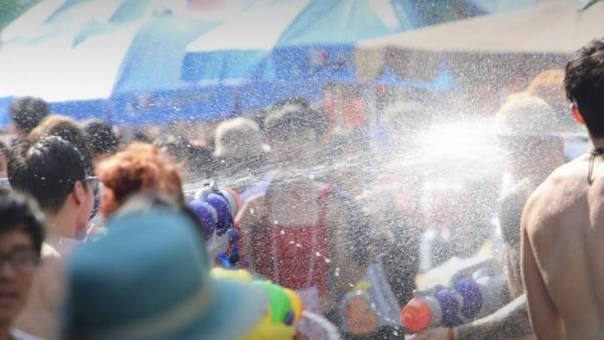
The Ministry of Public Health has rejected a request, from businesses on Bangkok’s famed backpacker haven Khaosan Road, to allow water splashing, although other ways to celebrate Thailand’s traditional New Year Songkran are permitted.
Public Health Minister Anutin Charnvirakul said today (Monday) that it is still necessary keep the risk of COVID-19 infections, from close contact, to a minimum among Songkran revellers.
He admitted, though, that it will be difficult to prevent people from being close together when they gather at a specific venue.
The minister then asked businesses in the Khaosan area to be patient and to wait another year before water splashing resumes, noting that public compliance with safety measures is needed, as Thailand is moving to classify COVID-19 as an endemic disease, tentatively by July.
Anutin explained that reducing the risk of infections is not the only prerequisite to attaining the goal of reclassifying COVID-19, because low rates of death and severe symptoms and health service readiness must also be considered.
Stressing the need for self-protection during the Songkran holidays in mid-April, he urged the public to start practicing safety measures from April 1st, so they will be familiar with them during the festival.
On March 18th, the Centre for COVID-19 Situation Administration (CCSA) announced a further ease of COVID-19 restrictions, including allowing some Songkran celebrations to take place, including traditional water pouring ceremonies and processions. The culture ministry later clarified that water splashing and public parties, which were known internationally, especially on Khaosan Road, remains prohibited.
The public health minister also confirmed that there is sufficient Favipiravir anti-viral medicine for distribution to hospitals for symptomatic COVID-19 patients, despite the Rural Doctor Society complaining that there is a widespread shortage.
He said that the provincial health office in each province is responsible for distributing Favipiravir to hospitals, adding that the medicine has both been imported and produced locally by the Government Pharmaceutical Organization.
According to the Disease Control Department, about 50% of those infected, but who are asymptomatic, do not need Favipiravir, just as those with mild symptoms, representing 25% of the infected, do not necessarily need the drug and can be treated with other medications in line with their symptoms.
Only 25% of the infected need Favipiravir, which is available in sufficient quantities to meet demand, said the department.
Thailand’s official daily COVID-19 infections have been above 20,000 since late February. However, the number is believed to be much higher, with a sizeable group of more than 20,000 testing positive each day using rapid antigen tests, who would need to have their results confirmed by RT-PCR tests.